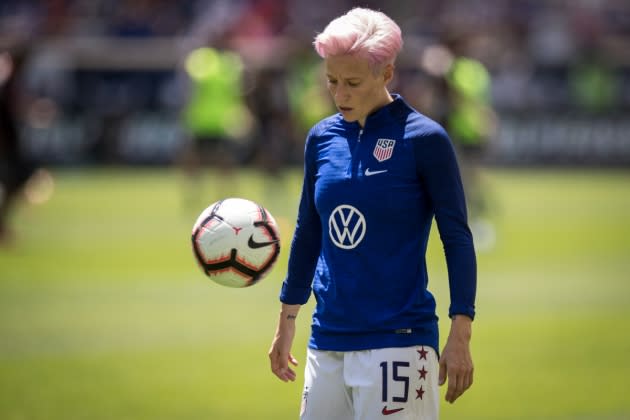Nike Athlete Urged to ‘Share Your Power’ as World Cup Kicks Off
- Oops!Something went wrong.Please try again later.
- Oops!Something went wrong.Please try again later.
- Oops!Something went wrong.Please try again later.

With the FIFA Women’s World Cup officially underway, labor activists are seizing the moment to advocate for garment workers.
Labour Behind the Label, a U.K. group focused on labor rights in the global apparel industry, launched a new campaign this week urging U.S. soccer star Megan Rapinoe to put pressure on her sponsor, Nike, to pay garment workers in Cambodia and Thailand.
More from Sourcing Journal
Nike, Macy's, Dick's, TJ Maxx Hit in Latest Retail Crime Wave
BGMEA: Union Leader's Murder Will Not 'Significantly Impact' Exports
The campaign asks supporters to send a pre-written letter addressed to Rapinoe and fellow U.S. soccer stars Tobin Heath, Christen Press and Meghan Klingenberg. The message mentions two groups of workers.
The first, a group of 1,284 former employees of the Violet Apparel factory in Cambodia, were let go “without notice” when the factory closed “unexpectedly” in July 2020, Labour Behind the Label wrote. The campaigners claim the workers were “robbed of legally-owed compensation” totaling $1.4 million, with many “still struggling with debts” from that time.
In Thailand, Labour Behind the Label claims more than 3,000 workers at Nike supplier Hong Seng Knitting were denied “legally owed” furlough pay during the pandemic. The campaign group contends that the factory refused to pay and threatened workers who are today owed $800,000.
“The garment workers—most of whom are women—have been asking for what they are owed by Nike for years and have tried every avenue possible, but Nike has continued to ignore them and deny responsibility even while they use slogans of women’s empowerment in their advertising,” the pre-written message says.
The campaign references Rapinoe and her teammates’ campaign to achieve equal pay for the U.S. Women’s National Team. When the team won the Women’s World Cup in 2019, four months after suing the U.S. Soccer Federation for pay discrimination, Nike released an ad celebrating the victory and supporting the players’ demands, Labour Behind the Label noted.
“Your struggle for fair pay for women pro-footballers has been inspiring,” the organization wrote in its letter. “We applauded your relentless struggle for equal pay, as we are standing with these workers in their relentless struggle for what they are owed. Your values, and your sponsorship deals and your close connections with Nike put you in positions where your allyship can change these workers’ lives. We are urging you to use your voice and share your power—by raising this case with Nike and ensuring garment workers are paid what they are owed.”
Human rights organization Equidem, meanwhile, is taking aim directly at FIFA. According to the U.K. campaigners’ investigation, women working in garment factories that source official merchandise for FIFA tournaments in Bangladesh earn below living wages, are forced into unpaid overtime and are threatened with job loss when pregnant. At the same time, women faced disproportionate levels of verbal abuse and illegal denial of worksite childcare and maternity leave, the London-based labor rights group claimed.
“I can only go to the restroom after finishing my hourly target,” Equidem quotes one worker as saying. “When a lot of work piles up, they don’t let us go anywhere. They verbally abuse us. I work for 10-12 hours a day at my sewing machine. Today, my supervisor told me to give 80 pieces per hour, but it was quite difficult to make 80 pieces. I made 60 pieces per hour. He shouted at me several times.”
Bangladeshi law dictates that workers are entitled to four months of paid maternity leave—eight weeks prior to birth and eight weeks afterwards. According to Equidem, workers at the factories it investigated did not get paid maternity leave “at all.”
“This movement toward gender parity within FIFA, signals a heightened commitment within the organisation to fair conditions for women players—on par with their male counterparts,” Equidem CEO Mustafa Qadri said in a statement. “This should extend to all women, not just those under the stadium lights.”

